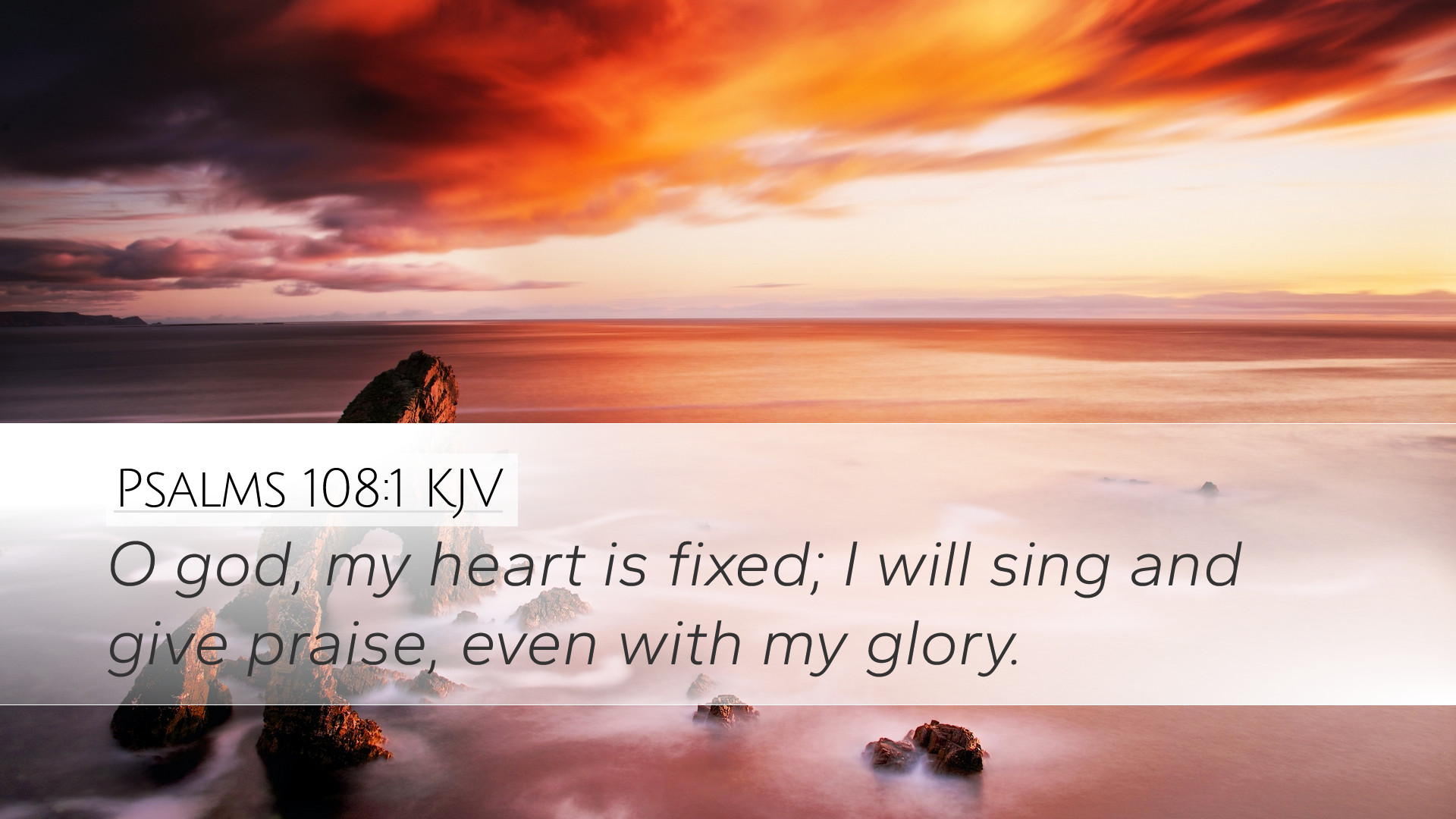Psalms 108:1 Commentary
Verse: "O God, my heart is fixed; I will sing and give praise, even with my glory."
Introduction
This verse from Psalms captures a profound expression of commitment and devotion from the psalmist. It highlights the importance of a steadfast heart in the act of worship and the role of personal glorification in seeking God's presence.
The Fixed Heart
Matthew Henry notes that the phrase "my heart is fixed" indicates a resolute determination to focus on God. This fixedness of heart is essential for sincere worship. The heart's fixation on God involves rejecting distractions and consolidating one's entire being into the act of praise.
Albert Barnes emphasizes that a "fixed heart" denotes stability and steadfastness, suggesting that the psalmist has made a conscious choice to dedicate his heart to God. This commitment is not passive; it involves an active pursuit of divine connection through song and adoration.
The Act of Singing and Praise
Adam Clarke states that singing is a natural expression of joy and gratitude. The psalmist’s intention to sing praises follows his declaration of a fixed heart, which underscores the unity between internal disposition and external expression. Clarke further suggests that singing serves as a means to edify both the singer and those who hear, promoting a communal experience of worship.
Moreover, Henry connects this act of singing with an outpouring of emotional and spiritual fervor. Singing praises becomes a medium through which believers can articulate their reverence and love for God. The psalmist, therefore, acknowledges that worship is not merely an obligation but a delight.
With My Glory
The phrase "even with my glory" holds significant theological weight. Barnes points out that "glory" here can be interpreted as one's abilities, honor, or the very essence of who one is. The psalmist resolves to make an offering of personal glory to God as an act of worship. This reflects a total alignment of the self with God's purposes, where personal accolades are set aside in favor of glorifying God.
Henry elaborates by noting the implications of giving God one's glory. He argues that worship should encompass all aspects of life, suggesting that the believer should not hold back any part of their identity in their devotion to God. Passionate worship involves every facet of one's life, indicating that true praise is comprehensive and all-encompassing.
Theological Reflections
This verse invites profound theological reflection on the nature of worship. First, it suggests that worship is an intentional act that requires preparation and commitment. A fixed heart is not spontaneously formed; it is cultivated through constant engagement with God. The psalmist calls believers to examine their hearts and ask whether they are prepared to enter into genuine praise.
Secondly, it emphasizes the relationship between the believer and God. The psalmist's declaration indicates a personal relationship that fosters a desire for communion. This intimacy invites every believer to recognize their value in God's eyes and the importance of expressing that relationship through worship.
Lastly, this verse encourages an understanding of worship that transcends mere ritual. Worship, as articulated by both Clarke and Henry, is about honoring God in every area of life. When one commits to glorifying God with their own "glory," it becomes a missional act, encouraging others to witness the beauty of living a life dedicated to praise.
Conclusion
Psalms 108:1, within its brevity, encapsulates the essence of what it means to truly worship God. A fixed heart, an outpouring of song, and the offering of one’s glory converge into a holistic approach to worship that is both personal and communal. For pastors, students, theologians, and biblical scholars, this verse serves as a reminder to seek a sincere heart posture, to engage deeply in corporate worship, and to honor God with every aspect of life.


